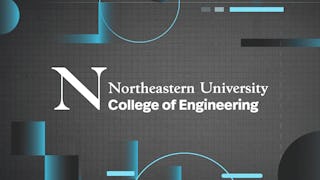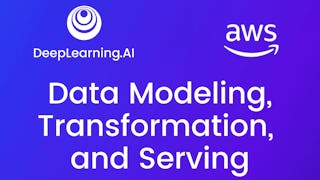This course introduces the student to the use of a database management system to provide the software and database necessary to upgrade a DBMS system. Database structures, applications, network, relational and hierarchical data models, applicate programs development, query systems, file security, and the role of the database administrator will be studied. A course fee may apply.

Profitez d'une croissance illimitée avec un an de Coursera Plus pour 199 $ (régulièrement 399 $). Économisez maintenant.

Expérience recommandée
Compétences que vous acquerrez
- Catégorie : Data Modeling
- Catégorie : Data Integrity
- Catégorie : Database Design
- Catégorie : Database Management Systems
- Catégorie : Data Security
- Catégorie : SQL
- Catégorie : Database Application
- Catégorie : Data Manipulation
- Catégorie : Relational Databases
- Catégorie : Query Languages
- Catégorie : Database Architecture and Administration
Détails à connaître

Ajouter à votre profil LinkedIn
33 devoirs
Découvrez comment les employés des entreprises prestigieuses maîtrisent des compétences recherchées

Il y a 9 modules dans ce cours
Welcome to Data Modeling and Applications! This course introduces the student to the use of a database management system to provide the software and database necessary to upgrade a DBMS system. Database structures, applications, network, relational and hierarchical data models, applicate programs development, query systems, file security, and the role of the database administrator will be studied. In Module 1 we delve into the foundational concepts of databases, contrasting them with traditional list-based data management. We'll explore the limitations of using lists, such as redundancy and the challenges of handling multiple themes in a single list, which can lead to complex data modification issues. By understanding these challenges, you'll appreciate the necessity and benefits of transitioning to a database system, which offers a structured, efficient approach to managing complex data sets.
Inclus
11 vidéos6 lectures4 devoirs1 sujet de discussion
In Module 2, we explore the relational model, a cornerstone concept in database design. This module will guide you through understanding how relational tables are structured, differentiating them from non-relational tables, and introducing essential relational terminology. You'll learn about the significance of keys, including primary and foreign keys, and how they are fundamental in establishing and navigating relationships within a database. Understanding Relations and Keys: We delve deeper into the relational model by examining how entities are represented in tables and how attributes and relationships are defined. The module will cover the characteristics of relations, ensuring you understand how tables are composed and the importance of key constraints in maintaining data integrity. By the end of this module, you'll have a solid foundation in how databases use relations and keys to organize data effectively and efficiently.
Inclus
9 vidéos5 lectures4 devoirs
Welcome to Module 3: Introduction to SQL. In this module, we'll embark on a journey to understand SQL – the language underpinning relational databases. You'll discover why SQL is crucial in database environments, as we differentiate between its variants like MS SQL and MySQL, and demystify the art of crafting basic SQL SELECT statements. We'll delve into the history of SQL, tracing its origins from the 1970s at IBM to becoming the de facto standard for managing relational databases. Understanding SQL's declarative nature will empower you to express what you want from a database without delineating how to achieve it, a paradigm shift from procedural programming languages. By the end of this module, you'll gain a solid foundation in SQL's data definition and manipulation capabilities, setting the stage for more complex data interactions. Whether you're defining new tables or querying data, the insights from this module will equip you with the knowledge to navigate and manipulate database environments effectively.
Inclus
11 vidéos6 lectures4 devoirs
Module 4 propels you deeper into the world of SQL, focusing on advanced techniques essential for sophisticated data management and analysis. Building upon the foundations laid in Module 3, we'll explore the intricacies of SQL JOINs, a pivotal concept allowing for the relational interlinking of tables, enriching your data querying capabilities. We'll cover various JOIN types—INNER, LEFT, RIGHT, FULL, and CROSS—each tailored for different data merging scenarios. Understanding these JOINs will enable you to construct more complex and powerful SQL queries, unveiling insights hidden within interconnected data. This module doesn't just stop at JOINs; it introduces you to SQL's potent functions and operators that facilitate advanced data manipulation and analysis. From aggregate functions that summarize data to scalar functions that operate on individual data points, you'll learn to harness SQL's full potential in transforming raw data into actionable insights. By the end of this module, you'll not only be adept at advanced SQL querying but also equipped to apply these techniques in real-world scenarios, ready to tackle any data challenge with confidence and finesse.
Inclus
9 vidéos5 lectures4 devoirs
Welcome to Module 5, where we delve deeper into the world of SQL, focusing on advanced techniques that elevate your data manipulation and analysis skills. In this module, we'll explore the intricacies of SQL JOINs, a crucial concept that allows you to combine data from multiple tables, providing a comprehensive view of your data landscape. We'll cover various JOIN types, including INNER JOIN, LEFT JOIN, RIGHT JOIN, FULL JOIN, and CROSS JOIN, each with its unique use cases and implications. You'll learn how to effectively use these JOINs to create more complex queries, enabling you to extract meaningful insights from your data. Whether it's understanding the nuances of self-joins or mastering the art of creating efficient queries that leverage multiple JOINs, this module is designed to enhance your SQL proficiency and equip you with the tools needed for sophisticated data analysis. By the end of this module, you'll not only have a solid understanding of different SQL JOINs but also gain the ability to apply these techniques in real-world scenarios, ensuring you can handle complex data challenges with confidence.
Inclus
10 vidéos5 lectures4 devoirs
Welcome to Module 6, where we dive into the intricacies of Data Modeling and the Entity-Relationship (E-R) Model, a fundamental framework for conceptualizing and structuring database schemas. This module will guide you through understanding the components of the E-R model, including entities, attributes, and relationships, and how they are utilized to construct a coherent and efficient database design. Exploring the E-R Model: In this module, you'll learn to create and interpret E-R diagrams, which visually represent the database's structure, showcasing how entities are interrelated. We'll cover different relationship types, such as one-to-one, one-to-many, and many-to-many, and introduce concepts like weak entities and recursive relationships. By the end of this module, you'll have a solid foundation in using the E-R model to design and analyze database schemas, preparing you for more advanced topics in database management.
Inclus
9 vidéos5 lectures4 devoirs
Welcome to Module 7, where we focus on transforming E-R data models into relational designs, a critical step in database design. This module will equip you with the skills to translate conceptual models into practical, structured database schemas. We'll delve into the normalization process, learning how to apply these techniques to ensure data integrity and optimize database performance. Advancing Database Design: As we progress, you'll gain insights into denormalization and its role in balancing efficiency and complexity in database structures. We'll explore how to represent weak entities and various relationship types within the relational model, enhancing your ability to design more sophisticated and effective database systems. By the end of this module, you'll be proficient in creating and manipulating relational designs, setting a strong foundation for advanced database management and optimization.
Inclus
13 vidéos5 lectures4 devoirs
Welcome to Module 8, focusing on Database Administration, a critical aspect of managing and maintaining a robust database system. This module will introduce you to the key responsibilities of database administration, including ensuring data concurrency, security, and effective backup and recovery strategies. You'll gain insights into the fundamental practices that keep a database reliable, secure, and performing optimally. You'll learn about the challenges and solutions in ensuring data integrity and consistency when multiple users access and modify the database simultaneously. By the end of this module, you'll have a comprehensive understanding of the critical role that effective database administration plays in the overall success of database management.
Inclus
12 vidéos5 lectures4 devoirs
This module contains the summative course assessment that has been designed to evaluate your understanding of the course material and assess your ability to apply the knowledge you have acquired throughout the course.
Inclus
1 devoir
Préparer un diplôme
Ce site cours fait partie du (des) programme(s) diplômant(s) suivant(s) proposé(s) par Illinois Tech. Si vous êtes admis et que vous vous inscrivez, les cours que vous avez suivis peuvent compter pour l'apprentissage de votre diplôme et vos progrès peuvent être transférés avec vous.¹
Instructeur

Offert par
En savoir plus sur Software Development
 Statut : Prévisualisation
Statut : PrévisualisationNortheastern University
 Statut : Gratuit
Statut : GratuitClemson University
 Statut : Essai gratuit
Statut : Essai gratuitDeepLearning.AI
 Statut : Essai gratuit
Statut : Essai gratuit
Pour quelles raisons les étudiants sur Coursera nous choisissent-ils pour leur carrière ?





Ouvrez de nouvelles portes avec Coursera Plus
Accès illimité à 10,000+ cours de niveau international, projets pratiques et programmes de certification prêts à l'emploi - tous inclus dans votre abonnement.
Faites progresser votre carrière avec un diplôme en ligne
Obtenez un diplôme auprès d’universités de renommée mondiale - 100 % en ligne
Rejoignez plus de 3 400 entreprises mondiales qui ont choisi Coursera pour les affaires
Améliorez les compétences de vos employés pour exceller dans l’économie numérique
Foire Aux Questions
To access the course materials, assignments and to earn a Certificate, you will need to purchase the Certificate experience when you enroll in a course. You can try a Free Trial instead, or apply for Financial Aid. The course may offer 'Full Course, No Certificate' instead. This option lets you see all course materials, submit required assessments, and get a final grade. This also means that you will not be able to purchase a Certificate experience.
When you purchase a Certificate you get access to all course materials, including graded assignments. Upon completing the course, your electronic Certificate will be added to your Accomplishments page - from there, you can print your Certificate or add it to your LinkedIn profile.
Yes. In select learning programs, you can apply for financial aid or a scholarship if you can’t afford the enrollment fee. If fin aid or scholarship is available for your learning program selection, you’ll find a link to apply on the description page.
Plus de questions
Aide financière disponible,

